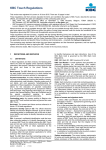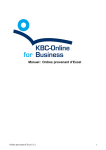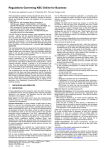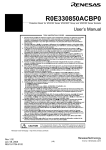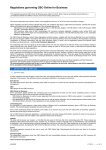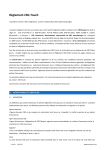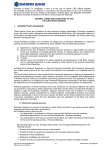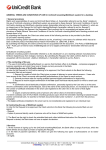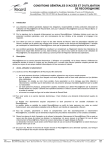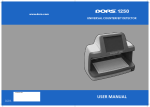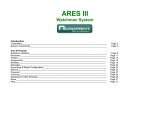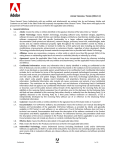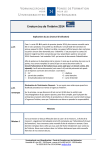Download KBC-Online Regulations
Transcript
KBC-Online Regulations This version was registered in Leuven on 30 June 2014. There are 14 pages in total. These regulations and their annexes stipulate the terms and conditions that apply to KBC-Online, describe the services offered, and establish the rights and obligations of the Contracting Party and of: • KBC Bank NV, with registered office at Havenlaan 2, 1080 Brussels, Belgium, FSMA 026256 A, RLP Brussels, VAT BE 0462.920.226, hereinafter referred to as the Bank, and • KBC Insurance NV, insurance company in Belgium, with registered office at Prof. Roger Van Overstraetenplein 2, 3000 Leuven, Belgium, RLP Leuven, VAT BE 0403.552.563, hereinafter referred to as the Insurer. These regulations and their annexes – together with the General Banking Terms and Conditions, the rates and charges notified in accordance with Article I.32 of the General Banking Terms and Conditions, the Regulations Governing Transactions in Financial Instruments, with the Order Execution Policy in annex, and the applicable General and Specific Policy Conditions and Endorsements – constitute the Framework Agreement. The Contracting Party declares that he has read these regulations and the Framework Agreement, and has explicitly agreed to be bound by them by signing the KBC-Online contract. 1 DEFINITIONS AND SERVICES 1.1 DEFINITIONS In these regulations and the annexes to which they refer, the following definitions will be used and applied unless expressly stipulated otherwise in the annexes. The definitions may be used without distinction in the singular or plural form. Bank branch: The KBC Bank branch where the Contracting Party holds his accounts or to which he has entrusted his insurance policies for management. Payment transaction: An action initiated by the Contracting Party or the user(s) involving the transfer of money, more particularly credit transfers, standing orders and direct debits, denominated in euros or in a currency of a Member State of the European Economic Area (EEA), where the payer's bank and the beneficiary's bank or the only bank involved in the payment transaction are/is established in the EEA. Notwithstanding the application of these regulations, the special terms and conditions for the execution of payment transactions (e.g., requirements regarding format, acceptance method, execution times, rules regarding value dating, etc.) are laid down in the General Banking Terms and Conditions and in the special regulations applying to specific payment services and payment instruments. Contracting Party: Any person residing in Belgium who signs a KBC-Online contract and also uses KBC-Online. Cookies: Small text files that are created by a program on the KBC website server, but saved on the hard disk of the Contracting Party's computer. These cookies are needed for KBC-Online to work. Among other things, they create a record of the web pages visited by the Contracting Party. They also ensure that the Contracting Party receives better quality service and that certain details do not have to be entered repeatedly. Cookies may, for instance, contain information on the language selected by the Contracting Party, so that information can automatically be displayed in the Contracting Party's preferred language the next time he visits the site. Cookies will not be used for any other purposes. Electronic identity card or eID: The official electronic identity card issued to Belgian nationals. It can be used by the Contracting Party in combination with an electronic identity card reader to identify himself and sign instructions. The Contracting Party cannot use such a card as a means of logging in to and accessing KBC-Online. An electronic identity card can only be used in combination with an electronic identity card reader and personal identiRegistered office: KBC Bank NV – Havenlaan 2 – 1080 Brussels – Belgium VAT BE 0462.920.226 – RLP Brussels – FSMA 026256 A Member of the KBC group CW3440 V06-2014 -/- P.1/14 fication number (PIN) to sign applications for, or purchases of, certain financial services remotely through KBC-Online. Card: The KBC Bank Card or Key-to-KBC Card which the Contracting Party uses in combination with the KBC Card Reader and his PIN to identify himself and sign instructions. Use of the KBC Bank Card is governed by the KBC Bank Card Regulations, while use of the Key-to-KBC Card is governed by the Key-to-KBC Regulations. KBC: KBC Bank NV, KBC Insurance NV or both. KBC Card Reader: A small device (Unconnected Card Reader) that generates an electronic signature. The Contracting Party places his Card in this device and enters the PIN linked to that Card. The card reader then calculates a new code with which the Contracting Party can identify himself and sign instructions. KBC-Online: All the procedures agreed between the Contracting Party and the Bank and the Insurer, respectively, facilitating access to various electronic services. KBC-Online also provides access to KBC's entire website. Order: Each instruction or order that the Contracting Party remits via KBC-Online to carry out a payment transaction, to carry out a payment order not falling within the definition of a payment transaction, to execute transactions in financial instruments (shares, bonds, etc.), or to carry out any other banking or insurance transaction, and each request for or acceptance of a contract for banking and insurance services. System requirements: The current system requirements, which should be referred to before conclusion of the contract, are available from any bank branch or insurance agent. They can also be viewed at www.kbc.be/kbconline/systemrequirements. Means of access and signature tools: (i) Either the KBC Card Reader, the Card and its PIN, as described in 'Annex 1 - Special terms governing use of the KBC Card Reader', which provide the Contracting Party with access to KBC-Online services and which generate an electronic signature to enable the Contracting Party to identify himself and sign instructions. (ii) Or the KBC E-Business Card, i.e. a smartcard with a personal certificate and a password, for the Contracting Party who is also registered as a user in KBC-Online for Business and authorised by the KBC-Online for Business contracting party to use the KBC E-Business Card made available to him as the means of access and signature tool for KBC-Online. The KBC E-Business Card is subject to the 'Specific Terms Governing KBC-Online for Business Security'. The certification and registration services are provided in accordance with the terms and conditions governing the relevant Certificate Policy (available at www.kbc.com/certificate-policy). Insurance agent: The independent intermediary other than KBC Bank NV who intermediates between the Contracting Party and KBC Insurance NV with regard to insurance. 1.2 SERVICES The Contracting Party can view information and remit orders/instructions using KBC-Online services, some of which are made available as standard to each Contracting Party, whereas others are optional. The Contracting Party can request access to these optional services either at the time the contract is concluded or at a later date. He can amend his choice at any time through his bank branch. Depending on the options offered by KBC, a number of services will be activated only after the Contracting Party has completed a number of formalities. The Bank and the Insurer reserve the right to refuse access to certain services. An overview of the services, which can be referred to before conclusion of the contract, are available from any bank branch or insurance agent. They can also be viewed at www.kbc.be/kbconline. The Contracting Party can find all the requisite information and a description of the main features and functions of the services in the General Banking Terms and Conditions, the specific regulations, and the product information available from his bank branch or insurance agent. It can also be viewed at www.kbc.be and www.kbc.be/kbconline. The Contracting Party acknowledges: (i) that he has received all the documents constituting the framework agreement prior to entering into the KBC-Online contract, along with all information regarding the features and functions of the services provided by KBC, allowing him to determine whether they meet his requirements; and (ii) that he may only use the services on the terms and conditions specified in the Framework Agreement. 2 INFORMATION PROVIDED BY THIRD PARTIES AND LINKS it guarantee their level of security or the suitability for a particular purpose of the information, data or publications they contain. Moreover, KBC does not offer any guarantee whatsoever in relation to the solvency and/or reliability of the site owners or managers, nor as regards the persons or companies on which any such site might provide information. KBC cannot guarantee the completeness, correctness or accuracy of the websites to which it provides links. Consequently, the Contracting Party may not hold KBC liable for any adverse consequences or any loss/damage which he might suffer as a result of (i) making contacts and concluding contracts through these hyperlinks, (ii) using information obtained via these hyperlinks, (iii) viewing any website visited via these hyperlinks. 3 TERMS AND CONDITIONS GOVERNING USE 3.1 ACCESS TO AND USE OF KBC-ONLINE The Contracting Party is required to check whether his telecommunication system (computer, Internet connection, etc.) complies with the specifications in the technical documentation included in the system requirements. KBC-Online is launched via the KBC website (www.kbc.be). KBC provides the necessary support for this facility, both online and via a help desk that can be contacted by telephone. The means of access and signature tools which the Contracting Party requires to (i) identify himself and to gain access to KBC-Online and the various services, and to (ii) sign orders using an electronic signature, are made available personally to the Contracting Party by KBC. The Contracting Party cannot use the eID card as a means of identifying himself in order to gain access to KBC-Online. An eID card can only be used in combination with an electronic identity card reader and access code to sign online applications for, or purchases of, certain financial services through KBC-Online. The Contracting Party must keep his eID and means of access and signature tools safe and use them in accordance with the provisions of these regulations and undertakes to comply with the security guidelines that are annexed to these regulations or provided for reference purposes and constitute an integral part hereof. 2.1 INFORMATION PROVIDED BY THIRD PARTIES 3.2 SIGNING ORDERS The Contracting Party can use certain KBC-Online services (such as Zoomit) to view information which has been made available by other KBC group companies or third parties for the purpose of meeting their legal obligations or otherwise. KBC cannot be held liable for the incorrectness, incompleteness or inaccuracy of information provided by these KBC group companies or third parties. Nor can this external information give rise to any liability whatsoever on the part of KBC. Subject to what is set out below, all orders initiated via KBC-Online have to be signed using the means of access and signature tools. Applications or contracts for certain types of bank and insurance services can – or in some cases – must be signed using an eID. The Contracting Party acknowledges that the means of access and signature tools and an eID form an electronic signature that meets the legal requirements regarding the accountability and integrity of the contents of the order. Notwithstanding any provisions to the contrary in these regulations, the Contracting Party recognises the legal validity of all orders initiated via KBC-Online and of orders executed by KBC that were signed using the means of access and signature tools or an eID. These orders constitute valid, sufficient proof of his approval of the existence and contents of the order. 2.2 LINKS KBC-Online offers links to third-party websites, which the Contracting Party may visit if he wishes. KBC is in no way an intermediary between the Contracting Party and the third party in question. KBC is in no way responsible for the content of the sites to which it provides a link, nor can CW3440 V06-2014 -/- P.2/14 KBC-Online Regulations The Contracting Party acknowledges that any KBC-Online messages he sends are not signed with an electronic signature and, therefore, undertakes not to use this KBC-Online messaging facility to remit orders. As an exception, however, the request to remove an optional service from the KBC-Online subscription (for instance, unsubscribing from Zoomit) may be made by sending a KBC-Online message to the branch. The Contracting Party acknowledges that the Bank may consider such a message to be valid. The Bank will take the necessary steps to ensure that the request for removal is acted on as quickly as possible. However, the Bank will only incur liability in this regard after five banking days have elapsed since it received the request to remove an optional service. 3.3 REFUSAL ON THE PART OF THE BANK OR THE INSURER TO EXECUTE AN ORDER The Bank reserves the right to refuse to execute orders if there are no or insufficient funds on the account to cover them. If the Bank refuses to execute a payment transaction, the Contracting Party will be notified of this without delay and, if possible, informed of the reasons for refusal. This notification will be made in print, via an e-mail sent to the e-mail address provided by the Contracting Party, or via another type of electronic carrier at the disposal of, and accessible to, the Contracting Party. Contracting Parties who receive everything in digital form will be sent notification by means of a KBC-Online message. 3.4 BLOCKING KBC-ONLINE KBC may block access to KBC-Online for objective legitimate reasons pertaining to the security of KBC-Online or to suspicion of unauthorised or fraudulent use of KBC-Online or the means of access and signature tools. In such cases, the Bank and/or the Insurer will – if possible – inform the Contracting Party before access is blocked or immediately after via a permanent carrier (on paper or in electronic format) at the disposal of and accessible to the Contracting Party. This information does not have to be provided if it clashes with objective, legitimate security reasons or it is prohibited under the relevant legislation. KBC-Online will be unblocked as soon as the reasons for the block no longer exist. 3.5 SPENDING LIMITS The execution of orders and payment transactions, in particular, is subject to spending limits that are set by type of transaction and/or the time period agreed between the Bank and the Contracting Party, within the maximum and minimum limits set by the Bank. With the consent of the Bank, limits can be adjusted at the request of the Contracting Party or his legal representative. Information on limits set can be obtained from any bank branch or at www.kbc.be/kbconline. 3.6 RIGHT OF USE AND INTELLECTUAL PROPERTY RIGHTS All intellectual property rights (or, in any event, the rights to grant the Contracting Party the right of use) to the KBC-Online software, the user manual, and all the component parts including, but not limited to, the apps, data, CW3440 V06-2014 -/- P.3/14 texts, logos, brand names and trade names that appear in KBC-Online, belong to the Bank, the Insurer or both, or to their third-party licensors. The Contracting Party is granted a personal, nonexclusive and non-transferable right of use for the term of this agreement. The Contracting Party will not infringe upon any intellectual property rights and undertakes to use KBC-Online solely in the way set out in these regulations and its annexes. 3.7 ACCESS TIMES KBC-Online is accessible 24 hours a day, 7 days a week, unless maintenance work is being carried out. 3.8 OBLIGATIONS OF THE CONTRACTING PARTY The Contracting Party must ensure beforehand that there are sufficient funds on account before giving a payment order. The Contracting Party must take all reasonable steps to safeguard the security of his means of access and signature tools or eID. For instance, he may not: (i) divulge the PIN for his Card to anyone or write it down in a recognisable form on the Card itself or on any other document; (ii) divulge the PIN for his eID to anyone or write it down in a recognisable form on the eID itself or on any other document; (iii) leave his computer or means of access and signature tools unattended (for instance, at his place of work, in a hotel or vehicle - even if it is locked - or in any place effectively open to the public); (iv) hand over the means of access and signature tools to third parties (including, but not limited to, his spouse/partner, a family member or friend) or allow them to be used by said third parties. The Contracting Party must: (i) notify KBC forthwith of the loss, theft, counterfeiting or any other misuse of KBC-Online and/or his Card or eID; (ii) strictly comply with the 'obligations of the card holder' as described in the KBC Bank Card Regulations (when using the KBC Bank Card) and in the Key-to-KBC Regulations (when using the Key-to-KBC Card); (iii) as regards banking transactions: notify KBC forthwith of any entries of unauthorised transactions on his account, as well as any errors or irregularities appearing on his statements of account; (iv) as regards insurance transactions: notify KBC forthwith of any indication of unauthorised transactions, as well as any errors or irregularities in the electronic information provided in KBC-Online or on the policy documents. The Contracting Party can report such incidents at any time by calling + 32 70 69 00 02. The Contracting Party must within three calendar days confirm this telephone notification in writing to the addresses of the Bank or Insurer, as relevant, as given in Article 7.1. If his Card is stolen, lost, counterfeited or misused in any other way, or a situation arises in which his PIN no longer remains secret, the Contracting Party must immediately KBC-Online Regulations (i) notify CARD STOP (+ 32 70 344 344) in the manner and in accordance with the procedure set out in the relevant card regulations; (ii) report the matter to the federal police. If his eID is stolen, lost, counterfeited or misused in any other way, or a situation arises in which his eID PIN no longer remains secret, the Contracting Party must immediately: (i) notify DOC STOP by calling 00800 2123 2123 (free of charge). (ii) report the matter to the federal police. 3.9 CANCELLING AN ORDER TO CARRY OUT A PAYMENT TRANSACTION A Contracting Party initiating a transfer order via KBC-Online is no longer able to cancel it once it has been received by the Bank. As soon as the Contracting Party has sent his signed transfer order, it will be deemed to have been received by the Bank. Without prejudice to the rights regarding repayment, however, the Contracting Party-Payer may in the case of a direct debit cancel the payment order up until the end of the working day preceding that on which it was agreed that the payment account should be debited. To cancel an order to carry out a payment transaction, irrespective of whether it concerns a transfer order or direct debit, the Contracting Party has to contact his KBC Bank branch. It cannot be cancelled via KBC-Online. The Contracting Party-Payer may use KBC-Online to cancel a transfer order with a payment date up until the end of the calendar day preceding the agreed payment date. 3.10 OBLIGATIONS OF THE BANK OR THE INSURER The Bank or the Insurer undertakes: (i) with the exception of the eID, to bear the risk associated with sending the Contracting Party the means of access and signature tools, in particular the personalised security features; (ii) to furnish the Contracting Party with the necessary means to facilitate at all times the notification specified in Article 3.8, or to request deactivation of a block in accordance with Article 3.4, and to make available to the Contracting Party the means to prove that he provided this notification, and this for a period of up to 18 months after notification was provided. (iii) to block any future use of KBC-Online - insofar as is technically possible - as soon as the Contracting Party has reported the loss, theft or misuse of his Card. (iv) subject to what is set out in Article 3.11, in the case of an unauthorised payment transaction - and after conducting a marginal evaluation to ascertain whether or not the Contracting Party has committed fraud - to immediately reimburse the Contracting Party with the amount of the unauthorised payment transaction, and where necessary, to return the payment account that was debited with the relevant amount to the state it would have been in had the unauthorised payment transactions not taken place (i.e. with the correct value date), plus any interest on that amount. In addition, the Bank will reimburse the CW3440 V06-2014 -/- P.4/14 amount of any subsequent financial consequences, in particular the amount of any costs incurred by the Contracting Party to determine the amount of loss to be compensated; (v) to inform the Contracting Party regularly of the precautionary measures to be taken to prevent any improper use of KBC-Online. (vi) in the event of a dispute concerning an unauthorised or improperly executed payment transaction, to produce evidence showing that the transaction was authenticated, correctly registered and booked to account and was not affected by a technical failure or other defect, provided that the Contracting Party has informed the Bank of the relevant payment transaction without delay and no later than 13 months after the date on which the amount was debited or credited for value. 3.11 RESPONSIBILITY AND LIABILITY Subject to the following provisions, the liability rules set out in Article I.27 of the General Banking Terms and Conditions apply. The Bank and the Insurer, respectively, will bear any and all risk associated with sending the Contracting Party the means of access and signature tools. This does not apply to the eID. As soon as the means of access and signature tools have been provided, the Contracting Party is liable for any claims arising from their use, subject to what is set out below. In the case of loss, theft or misuse of the means of access and signature tools, the Contracting Party will be liable for the unauthorised use thereof until the loss, theft or misuse is reported as laid down in Article 3.8. Until the loss, theft or misuse is reported in the way set out in Article 3.8, the liability of the Contracting Party for unauthorised payment transactions resulting from unauthorised use of his means of access or signature tools is, however, limited to 150 euros per claim. By claim is meant all loss or damage resulting from the misuse of the same lost or stolen means of access and signature tools. The above limitation of liability will not apply and the Contracting Party will bear any loss or damage that arises if he has acted fraudulently, or with intent or gross negligence. Whether or not gross negligence occurred in the given circumstances is up to the court, whose decision is final. The Contracting Party must, however, be aware that he has to keep his means of access and signature tools safe and secure and use them as set out in Article 3.8, otherwise KBC-Online may be misused. The Bank warns the Contracting Party that certain behaviour including (but not strictly limited to) the following can lead to losses for which he may be held liable: (i) a failure on the part of the Contracting Party to observe his obligations or the violation of security guidelines, such as keeping his KBC Card Reader, Card and PIN or his electronic identity card reader, eID and its PIN in a recognisable form in the same place (written down on the relevant card itself or on a document that he keeps with his Card or eID and that he keeps on his person with his Card or eID); (ii) giving his means of access and signature tools, including his Card or eID, and divulging his PIN to third parties (including his spouse/partner, family members and friends); KBC-Online Regulations (iii) allowing KBC-Online to be used by third parties; (iv) leaving the means of access and signature tools unattended, for instance, at work, in a hotel, in a vehicle - even if it is locked - or in any place effectively open to the public; (v) failing to report any loss or theft immediately; (vi) failing to have KBC-Online blocked immediately if the Contracting Party discovers that his Card or eID has been lost, stolen or misused; (vii) a failure on the part of the Contracting Party to notify the Bank without delay of any entries of unauthorised transactions on his account and any errors and irregularities appearing on his statements of account.. As regards unauthorised payment transactions, the Contracting Party is not liable for any loss or damage attributable to loss, theft or misuse of the means of access and signature tools that arises after this has been reported, except in the case of fraudulent conduct. Subject to what is set out as regards unauthorised payment transactions, the Contracting Party is not liable for any loss or damage attributable to loss, theft or misuse of the means of access and signature tools that arises after this has been reported, except in the case of fraudulent conduct, intention or gross negligence. In derogation from the previous clauses, and save for evidence of fraud or an intentional act on the part of the Contracting Party, the Contracting Party will not be liable if a payment transaction was effected without physical presentation of the Card or without electronic identification. In derogation from the previous clauses, and save for evidence of fraud or an intentional act on the part of the Contracting Party, the Contracting Party will not be liable if the means of access and signature tools were copied by a third party or were misappropriated, insofar as the Contracting Party had these means of access and signature tools in his possession at the time of the disputed transaction. KBC cannot be held liable if some of the KBC-Online facilities are temporarily unavailable due to maintenance work, defects or force majeure. KBC will be liable in the event of non-execution or improper execution of orders initiated via KBC-Online, unless the Contracting Party has failed to meet his obligations. KBC must make all the efforts required to ensure that proper service is provided and that an appropriate security and identification system is in place. However, neither the Bank nor the Insurer can be held liable if this service is interrupted as a result of technical malfunctions or disruptions in the network which are beyond the immediate control of the Bank or the Insurer as service providers (i.e. the responsibility of the provider or manager of the teletransmission system). KBC is not liable for any loss or damage resulting from, among other things, the computer system, the Contracting Party’s Internet connection or the inadequateness of its security. CW3440 V06-2014 -/- P.5/14 3.12 TERM AND TERMINATION This KBC-Online contract is open-ended. The Bank may terminate access to KBC-Online with immediate effect and without providing formal advance notice when the Contracting Party has not logged on for 12 months continuously. This KBC-Online contract may be terminated under the following conditions: (i) The Contracting Party may, at no cost, terminate his KBC-Online contract at any time by contacting his bank branch or insurance agent. (ii) The Bank and the Insurer are entitled to cancel the contract at any time, subject to two months' notice. The termination must be made on paper or another permanent carrier. (iii) Both the Bank and the Insurer are entitled to terminate the contract forthwith, without having to provide formal notice in advance or having recourse to the courts, if: - confidence in the Contracting Party is seriously impaired; - the Contracting Party fails to comply with the security procedures; - there is a serious breach of contract. In this case, too, cancellation by the Bank will serve as cancellation by the Insurer, and vice versa. The Contracting Party may claim a refund of the charges levied for the service, and this in proportion to when the service is terminated, save in the cases set out in Article 3.12(iii). 3.13 EXERCISING THE RIGHT TO CANCEL FINANCIAL SERVICES SOLD REMOTELY Any Contracting Party concluding an agreement via KBC-Online for a financial service has 14 calendar days to cancel this service, without having to pay a penalty or provide a reason for doing so. This period of 14 calendar days starts on the day after the agreement has been concluded, more particularly when the electronic application form has been signed using the electronic signature, or on the day on which the Contracting Party receives the terms and conditions governing the agreement, if this is at a later date. This right to cancel can be exercised by letter addressed to the KBC Bank branch handling the account. If the Contracting Party has already paid for this service, then the charges in question will be repaid by crediting his account within 30 calendar days. If the Contracting Party fails to exercise the right to cancel, he will be bound for the duration set out in the relevant terms and conditions of the financial service agreement concluded. The Contracting Party can find more information on the duration and cancellation terms in the special terms or regulations governing the relevant financial service. The right to cancel does not apply to financial services whose price depends on fluctuations on a financial market which the Bank has no control of, such as stock exchange orders. KBC-Online Regulations 4 ACCOUNT INFORMATION AND DATA PROCESSING 4.1 STATEMENTS OF ACCOUNT AND OTHER INFORMATION 4.1.1 After every transaction on an account or after a specific period, the Bank will provide the Contracting Party with a statement of account, which may or may not be accompanied by annexes. The statement of account records the transactions performed on the account, together with the old and the new balance. It enables the Contracting Party to keep track of and check the transactions and balances on his account. The Contracting Party can retrieve his statements of account via KBC-Online immediately after executing a payment transaction. Information relating to charges for payment transactions will be made available at least once a month by means of annexes to the statements of account. Contracting Parties who have opted to receive their statements of account and annexes in electronic form are required to view them via KBC-Online and can print out and save them on their own computer. They will no longer be able to retrieve their statements and annexes at KBC-Matic printers. Without prejudice to what is set out in Article 4.1.6, the statements and annexes will no longer be sent to them by post. Any statements of account and annexes that are not printed out will remain available via KBC-Online for ten years. The Contracting Party can request his bank branch to provide paper copies of statements against payment. 4.1.2 Contracting Parties who have opted to receive their statements of account in electronic form, agree that (i) the annexes to these statements will be made available to them in this way, as well. (ii) all personal time-related notifications will be made by KBC-Online message. The Contracting Party can also opt to receive from the Bank and the Insurer other personal notifications, information and advertising material in electronic form via KBC-Online. He can indicate this preference in his client details. 4.1.3 Contracting Parties undertake to read their statements of account and the annexes at least every 30 days. Contracting Parties whose account statements, annexes and other information are provided via KBC-Online also undertake to read their non-commercial messages at least every 14 days. Non-commercial messages are all personal notifications and information sent to clients, except for their statements of account (which may or may not be accompanied by annexes) and pure advertising material. As regards dispute possibilities and the time of irrevocable acceptance, please see Article 4.1.4. in writing to the Bank in the manner and within the period stipulated in Article I.25.1 of the General Banking Terms and Conditions. After the periods referred to have elapsed, the statement of account and the balance printed thereon, as well as the content of the non-commercial messages, will be irrevocably considered to have been accepted in full. 4.1.5 The Contracting Party undertakes not to unlawfully manipulate or falsify any statements of account retrieved via KBC-Online. If there are any differences between the statements of account printed out by the Contracting Party and the statements drawn up by the Bank (duplicates), the duplicates based on account details that appear in the Bank’s books and in the Bank's log will prevail and constitute formal proof of the transactions carried out by the Contracting Party. Information contained in the Contracting Party's policy documents constitute formal proof of the insurance transactions carried out on the instructions of the Contracting Party. It will take precedence over insurance-related information provided via KBC-Online. 4.1.6 If statements of account and other information are made available via KBC-Online, and: (i) the Contracting Party fails to check them in good time, in accordance with Article 4.1.3; (ii) the Contracting Party has not carried out any transactions using KBC-Online for a relatively long period of time, as determined by the Bank based on the circumstances, the Bank and the Insurer reserve the right to post the statements of account, annexes and other information to the last-stated address. The forwarding expenses are to be paid by the Contracting Party. 4.1.7 The Contracting Party may also send messages, with or without attachments, via the secure KBC-Online environment to his contact at his bank branch or insurance agency. The Contracting Party acknowledges that these messages are not signed with an electronic signature and, therefore, undertakes not to use KBC-Online messages to remit orders in the way set out in Article 3.2. The size and shape requirements which the attachments must satisfy are set out in the relevant screen in KBC-Online. The messages in the Contracting Party’s inbox will be kept for one year. If the Contracting Party wants to keep them for a longer period, he will have to save them to a permanent carrier of his own. When the Contracting Party sends a message to his contact in the bank branch or insurance agency, it may be read by several members of staff to ensure that it receives a reply even if the contact is absent. 4.1.4 Any dispute concerning unauthorised or improperly executed orders, including payment transactions, or concerning statements of account, annexes to these statements or non-commercial messages must be notified CW3440 V06-2014 -/- P.6/14 KBC-Online Regulations 4.2 DATA PROCESSING 6 AMENDMENT OF THE PRESENT REGULATIONS AND ADDITION OF NEW SERVICES With regard to the processing and exchange of personal data and customer-related data, reference is made: a. as regards processing for which the Bank is responsible, to (i) Articles I.13 and I.14 of the General Banking Terms and Conditions, which the Contracting Party declares to have read and expressly accepted; and (ii) KBC Bank NV's general privacy statement; b. as regards processing for which the Insurer is responsible, to (i) the insurance policies concerned, their special and general conditions, as advised to and expressly accepted by the Contracting Party when he took out the relevant insurance; and (ii) KBC Insurance NV's general privacy statement. The documents referred to above may be obtained from any bank branch or insurance agency, respectively, and can be downloaded from the KBC website (at www.kbc.be/documentation and www.kbc.be/privacy). Certain KBC-Online services use cookies to provide the Contracting Party with a better service. The Contracting Party expressly agrees to their use. If new KBC-Online services are added, the Contracting Party – after having been notified in accordance with the legal requirements in respect of the main features, terms, conditions and charges for these new services – can immediately authorise them in the manner agreed for the service in question. 5 7 CHARGES Notwithstanding the charges for using the underlying services and transaction charges, the Contracting Party has to pay an annual fee for the use of KBC-Online, as set out in the rates and charges notified in accordance with Article I.32 of the General Banking Terms and Conditions. 6.1 AMENDMENT OF THE PRESENT REGULATIONS AND THEIR ANNEXES The Bank and the Insurer reserve the right to amend the provisions of these regulations and their annexes. To the extent that this is required by law, any amendment will be communicated to the Contracting Party at least two months before its planned entry into effect, either on paper or via a permanent carrier made available to him. The Contracting Party may avail himself of the opportunity within this two-month period to terminate the agreement forthwith and at no cost if he does not agree to the proposed amendments. Amendments will be binding on the Contracting Party if he does not cancel the agreement within two months of notification. 6.2 ADDITION OF SERVICES IN KBC-ONLINE DISPUTES 7.1 COMPLAINTS HANDLING If the Contracting Party has a complaint regarding a KBC-Online service or the execution of orders, he must follow the procedures described in Article I.25.2 of the General Banking Terms and Conditions. 7.2 GOVERNING LAW AND COMPETENT COURT The rights and obligations of the Contracting Party and KBC are governed by the laws of Belgium. All disputes are subject to the jurisdiction of the Belgian courts. CW3440 V06-2014 -/- P.7/14 KBC-Online Regulations ANNEX 1 SPECIAL TERMS GOVERNING USE OF THE KBC CARD READER THE KBC CARD READER The KBC Card Reader security system is based on symmetric cryptography. Using his Card and its PIN, the Contracting Party can generate an electronic signature in the form of a unique numerical code which enables him to identify himself and to sign instructions. If the Contracting Party enters an incorrect code generated by his KBC Card Reader three times, access to KBC-Online will be blocked for his Card. In other words, he will no longer be able to start up KBC-Online with that Card. However, he will still be able to use it for facilities other than KBC-Online. The Contracting Party will have to contact his bank branch or insurance agent. The Contracting Party should only insert his Card into card readers issued by KBC and should never enter his PIN via the keyboard of his computer. The Contracting Party must ensure that his card number is not saved in a cookie on a shared computer. SECURITY GUIDELINES The Contracting Party is responsible for the security of his computer, and is strongly advised to install a virus scanner and firewall, and to use the latest version of his operating system/browser. The Contracting Party is required to check whether the means of access and signature tools are valid and issued by the appropriate body, as described at www.kbc.be/security. CW3440 V06-2014 -/- P.8/14 KBC-Online Regulations ANNEX 2 - SPECIAL TERMS APPLYING TO 'ZOOMIT' Provided the provisions set out in this annex do not explicitly derogate from the provisions set out in the Regulations governing KBC-Online, the latter provisions will remain in force. Definitions 2 Unless expressly stipulated otherwise, the following definitions will supplement the ones appearing in Article 1.1 of the Regulations governing KBC-Online. This annex constitutes an integral part of these regulations. Basic Details: The surname, first name, possibly other first name they may go by, and account number of the individual, and the name and company number of the legal entity. Document: Each electronic business document relating to financial transactions already or to be carried out, such as invoices, and HR-related documents, such as pay slips, created by a Sender with the intention of making them available to the Recipient via the Zoomit platform. Contracting Party: The person (individual or legal entity), as defined in the Regulations governing KBC-Online, who has signed an e-banking agreement. User: The individual, i.e. the Contracting Party. The User is given access to the Documents if he is the Recipient, or if he has been granted access to view them by the Recipient. That can happen either explicitly, by means of a power of attorney for information purposes, or implicitly, by means of a power of attorney over the Recipient’s account. Recipient: The individual or legal entity intended to receive the Documents made available via Zoomit. Matching Test: The User’s Basic Details in the Bank's records are compared with the Recipient’s Basic Details in the Sender's records of debtors/creditors, in order to establish whether the User is entitled to view a Document as the Recipient thereof, or as the one who has been authorised to view it by the Recipient. The Matching Test is performed within Zoomit by Isabel NV in the way described in Article 5. Sender: The company – for instance, a supplier or employer – which draws up the Documents and which sends and makes them available to the User via Zoomit. Zoomit platform: The hardware and software managed and maintained by Isabel NV, with registered office at Keizerinlaan 13/15, 1000 Brussels, Belgium, RLP 0455.530.509, and to which the Bank is connected with a view to providing the Zoomit service. The most important relationship for the Zoomit service is the relationship between the Recipient (for instance, a customer of a utilities company) and the Sender. It is in that relationship that the Recipient decides whether or not to receive invoices or pay slips as digital Documents. It is also in that relationship that arrangements are made for receiving (similar) documents (at the same time) via other channels (including copies received by ordinary post, fax, e-mail, etc.). This often happens by means of the Sender’s (general) terms and conditions. The Bank is not involved at all in the Recipient-Sender relationship and does not bear any responsibility in that regard. 1 Zoomit service Zoomit is a service for the secure exchange of Documents between Senders (for instance, utilities companies) and the Recipient (for instance, a customer of said companies). The Documents are made available and accessible to the Recipient via his or his agent’s e-banking application. Zoomit also makes it easier to carry out payments, if the User opts for it to fill in the payment order. Therefore, Zoomit essentially has two purposes: (i) To deliver Documents securely in digital form. (ii) To simplify payment orders by filling in the basic details of the order using the information provided on the invoice. CW3440 V06-2014 -/- P.9/14 3 Arrangements with Senders form the basis Access to the Documents The User may only access Zoomit from KBC-Online using the means of access and signature tools for the e-banking application. The fact that several Users can be linked to one account does not automatically imply that each User will receive access to the Documents remitted by the Sender. The User may only view Documents intended for him. Documents are intended for him if he or his agent is the Recipient of these documents. A Matching Test will be performed before the User can view a Document in Zoomit. It is only when this test has been successful (see Article 5) that the User is granted access to the Document. In the 'Account information' facility, an icon in the window showing details of the current account will indicate that there are Documents available in Zoomit for the relevant accounts. The Contracting Party has access to Zoomit via these icons. As the person signing the KBC-Online contract, the Contracting Party has automatic access to Zoomit. This means that these icons will always be shown, regardless of whether the Contracting Party has actually used Zoomit, or whether he has already added a specific Sender, where necessary, to his list of Senders. If the Contracting Party unsubscribes for a specific Sender or from Zoomit in its entirety, these icons will no longer be shown for that Sender or will not be shown at all. It is only when the Contracting Party unsubscribes from Zoomit in its entirety that these icons will no longer be shown. If the Contracting Party unsubscribes for a specific Sender, these icons will continue to be shown, but the Contracting Party will receive the Documents in the way he has agreed with the Sender. When the User clicks the Document, he exits the secure KBC-Online environment and is taken to a secure website/server set up by or for the Sender, where he can view the Document, without it ever entering the Bank’s systems or servers. The Bank is not responsible for the content of the Senders’ sites/servers and does not guarantee their level of security. The Bank cannot access or inspect the Documents that are saved on the servers of the Sender. The Bank only has access to the Basic Details to ensure that the User can retrieve the Documents. KBC-Online Regulations The Documents on the Sender's website or server may only be viewed for a certain period of time, viz. the period stipulated in the contractual terms and conditions of the Sender. 4 The Matching Test Zoomit takes: (i) the identification details of the Contracting Party and/or his authorised User, as recorded by the Bank and verified using the means of access and signature tools for the e-banking application, and compares them with: (ii) the identification details of the Recipient or his authorised User, as obtained from the Sender of the Documents.. As a rule, the data on both the Sender’s and Bank’s records have to be a perfect match. If this is the case, access will be granted to the Contracting Party and his authorised Users. If not, access will be denied. If the account number matches, but the surname and first name of the Recipient do not, the Sender may in certain cases still permit the User to inspect the Documents, depending on their confidentiality level: (i) When the Sender sets the Document's level of confidentiality as 'sensitive', there has to be a perfect match between (1) the identification details of the Contracting Party and/or his authorised User (surname, first name and aliases) and the bank account number of the Contracting Party, as recorded by the Bank, and (2) the identification details of the Recipient or his authorised User (surname, first name) and the bank account number, as provided by the Sender of the Documents. If the test returns a perfect match, access will be granted to the Recipient and his authorised Users. (ii) When the Sender sets the Document's level of confidentiality as 'not sensitive', the test must show that there is a match between (1) the identification details of the Contracting Party and/or his authorised User (surname, first name and aliases) and the bank account number of the Contracting Party, as recorded by the Bank, and (2) the identification details of the Recipient or his authorised User (surname, first name) and the bank account number, as provided by the Sender of the Documents. If this is the case, access will be granted to the Recipient and his authorised Users. If not, access will be denied. If this initial test fails, the Document may still be accessed if the authenticated KBC-Online User requesting access to the Document declares that he has been duly authorised to do so by the Recipient. The Recipient will be duly informed and may object to this, if necessary. For each Sender, the Recipient may also indicate in the Zoomit application whether he has granted explicit permission to the other Users, who now or in the future hold a power of attorney over his current account(s) or who – by some other means – have access to the relevant current account(s), to inspect the Documents intended for him. CW3440 V06-2014 -/- P.10/14 5 Paying Documents The User can pay Documents whose status is ‘awaiting payment’ by clicking on ‘Pay this invoice’. The amount, beneficiary’s account number and reference will then be filled in automatically in the ‘transfers’ screen. The User is then required to continue this transaction in the same way as for fund transfers entered manually. The Document’s status only changes automatically to ‘payment initiated’ when the payment order is entered in this way in KBC-Online (via the ‘Pay this invoice’ button). It is not an indication that payment has actually been made and does not constitute proof of payment. Only statements of account serve as proof of payment. If the User pays the Documents whose status is ‘awaiting payment' by another means (such as by entering the details manually in KBC-Online) or through another channel (such as a paper-based transfer), the Document will still show the status ‘awaiting payment', unless the User changes it manually in Zoomit. The User is responsible for managing and following up payments already or to be carried out. 6 Data processing Personal data and customer-related data – including the Basic Details – will be processed when Documents are made available via Zoomit. As the party responsible for processing, the Bank processes the personal data of the Recipient and his User(s) in order to permit them to see and, if necessary, pay the Documents via Zoomit. This means specifically in relation to Zoomit that the Bank processes data on the Recipient and the User(s) for the following purposes: (i) Registering and recording whether the Recipient and the User(s) wish to use Zoomit. (ii) Checking the transaction details against the Senders' account numbers to see which ones the Recipient has already carried out transactions with. (iii) Passing on the personal data of the Recipient and the User(s) to Isabel NV, so that it can be used for the Matching Test. (iv) Informing the User(s) about the availability of Documents from a Sender in Zoomit (for instance, by means of an icon in the 'Account information' facility), regardless of whether the Recipient and his User(s) have actually used Zoomit, or whether he has already added a specific Sender, where necessary, to his list of Senders. If the Recipient unsubscribes for a specific Sender or from Zoomit in its entirety, the Bank will not inform its User(s) (any longer) about the availability of Documents. (v) Notifying potential and/or existing Senders that a certain account number is being used for online banking, but only if the Sender has received permission from the Recipient to do so. If the User wishes the Sender not to be notified (any longer) that he uses online banking facilities, he can simply unsubscribe. In that case, the Recipient and User(s) may not use Zoomit for any Recipient whatsoever. If the Recipient no longer wishes to use Zoomit, he can simply unsubscribe. KBC-Online Regulations The Recipient and the User can inter alia unsubscribe (i) in their bank branch; (ii) or by means of a KBC-Online message to their branch. If the User acts on behalf of the Recipient, the User expressly declares that he has received a valid mandate for that purpose from the Recipient. The Sender is the party responsible for processing the personal data of the Recipient and the User(s) in order to provide them with Documents in electronic form via Zoomit and to permit these Documents to be viewed. The Bank and the Sender(s) will outsource the task of performing the Matching Test to Isabel NV, which will act as the processing party. This means that Isabel NV may not use the personal data in Zoomit for any purposes other than those described herein. The Recipient and the User(s) are entitled to inspect the data held by the parties responsible for processing it (the Bank and the Sender) and, if necessary, request it to be corrected free of charge. The Bank will take all the measures and use all the security techniques necessary to protect the personal data it processes – therefore, including the link to the Documents, but not the Documents themselves (which are the responsibility of the Sender) – from loss, theft, damage and unauthorised access by third parties. An overview of the different flows of information and data in Zoomit, and of the ways to unsubscribe via the Bank, is provided in the Bank’s specific privacy statement on Zoomit. More detailed information on the Bank’s use of (personal) data and the exercise of rights in general is provided: (i) in Articles I.13 and I.14 of the General Banking Terms and Conditions of the Bank; (ii) and in the Bank's general privacy statement. The General Banking Terms and Conditions and the general and specific privacy statements of the Bank may be obtained from any KBC Bank branch or downloaded from the KBC website (via www.kbc.be/documentation and www.kbc.be/privacy, respectively). Information relating to privacy is also provided on Zoomit’s website (https://www.zoomit.be/content/zoomit/en.html > privacy). 7 Obligations of the User 7.1 The User undertakes to comply strictly with all security guidelines relating to use of the means of access and signature tools, as set out in Article 3.8 of the Regulations governing KBC-Online. 7.2 The User undertakes to inform the Bank without delay of any misuse by an unauthorised third party (for instance, Documents being seen by a third party who has not received permission from the Recipient to do so), or if he suspects that misuse has occurred, in the manner stipulated in the relevant regulations. 7.3 The Bank and Isabel NV offer the User just one means via Zoomit to make it easier to pay Documents. The User bears full responsibility for making timely and correct payment, and ensuring that there are sufficient funds on account. CW3440 V06-2014 -/- P.11/14 7.4 The User undertakes to address any dispute or complaint about the workings of the Zoomit service in writing to the departments specified in Article 7.1 of the Regulations governing KBC-Online, within the period specified in Article 4.1 of the same regulations. After this period, the transaction/event can no longer be disputed. 7.5 The User acknowledges that disputes regarding the content of Documents (for instance, incorrect invoicing) must be settled directly with the Sender(s). The Bank is not a party to any agreements between the User and the Sender. 7.6 The User acknowledges that the Documents on the Sender's server may only be viewed for a certain period of time, viz. the period stipulated in the contractual terms and conditions of the Sender. The Documents will no longer be available either even if this period has not yet elapsed - if the contractual relationship between the Contracting Party and the Bank, or the Zoomit application is terminated in full or in part (for certain Senders). The User who still wishes to inspect the relevant Documents in the above-mentioned cases will himself be responsible for storing/archiving these Documents (for instance, by downloading them onto his hard disk). 8 Obligations of the Bank 8.1 Unless expressly stipulated otherwise, the obligations of the Bank as regards the Zoomit service are entered into solely on a best efforts basis. The Bank provides the Zoomit service without guaranteeing its quality. The Bank does not provide any guarantee whatsoever as regards: - the continuous, uninterrupted, or defect-free working of Zoomit; - the availability of Documents; - the quality, accuracy, correctness and reliability of these Documents; - the access and response times. 8.2 The Bank reserves the right to interrupt the Zoomit service to carry out maintenance work, or to modify or upgrade Zoomit itself. The Bank will do all in its powers to notify the User of this beforehand and to keep the duration of such interruptions as short as possible. However, interruptions could occur before there has been time to provide a warning, for instance, when there is a technical incident or in the event of force majeure, including but not limited to strikes or events beyond the control of the Bank, or in cases of acute emergency. 9 Responsibility and liability 9.1 Without prejudice to what has been set out in Article 3.11 of the Regulations governing KBC-Online, the Bank cannot be held liable for any loss or damage whatsoever resulting from: - the non-availability of the Zoomit service due to pre-announced maintenance work or force majeure; KBC-Online Regulations - any acts or omissions on the part of the User that are in contravention of the provisions contained in the 'Special terms governing use of Zoomit'; - failure on the part of the User to comply with the security guidelines and/or instructions; - failure of the Matching Test due to the Contracting Party and/or the User providing incorrect or incomplete information to the Bank or the Sender; - any incorrect declarations on the part of the User regarding his right to access the Documents. The Bank is not responsible for any indirect or consequential loss or damage or any intangible loss resulting from or related to the use of Zoomit, including but not limited to loss of time, loss or damage suffered by clients, loss of information, loss of earnings, loss of profit, increases in general expenses, disruption of business operations, claims by third parties, damage to reputation, or expected savings resulting from or related to the use of Zoomit. The liability of the Bank as regards the Zoomit application is limited to 25 000 EUR. 9.2 Only the Sender has a right to inspect and correct Documents. Only the Sender is liable for the content, quality, accuracy and correctness of Documents. Complaints or questions about Documents or their contents will not be handled by the Bank, but should be addressed directly to the Senders. Furthermore, the Bank is not liable for: - incomplete, incorrect or outdated information on the site of the Sender or third party to which they grant access by means of a hyperlink; - the solvency or reliability of the Sender or other site owner to which the link is made; - any failure on the part of the Sender to meets its delivery obligation or any other statutory or contractual obligation towards the Recipient; - the inability to create any connection required to provide the service, and the interruption of the connection, when this is attributable to third parties. 9.3 The Sender of the Document decides which Matching Test will be applied to which Documents (see Article 5). The Bank bears no responsibility in this regard. 10 Intellectual property rights The proprietary rights and other intellectual property rights relating to the Zoomit service – such as those covering programs, software, brand names, the trade name and the logo – belong to Isabel NV and will in no way be transferred to the User. The User will refrain from violating these rights in any way. He may use the Zoomit application and documents solely for his own needs and will not copy or distribute them, or make them available to third parties. The User is prohibited from modifying the programs and Zoomit screens in any way whatsoever. 11 Charges Access to and the use of Zoomit is free of charge, without prejudice to any charges applying to KBC-Online and the means of access and signature tools, and without prejudice to the contractual stipulations and arrangements between the Recipient and the Sender. 12 Termination Save in the case of cancellation, subscription by the Contracting Party is for an indefinite period of time. The Contracting Party may at any time: (i) unilaterally cancel the Zoomit application in his subscription for KBC-Online; (ii) use the administrative module in Zoomit to cancel his contract with one or more Senders for the receipt of Documents. These particular forms of cancellation take effect on the next working day, unless another period of notice is stipulated in the terms and conditions of the Sender.. The Bank is entitled to terminate the Zoomit application, subject to two (2) months' notice, or without any notice in the cases set out in Article 3.12(iii) of the Regulations governing KBC-Online. If the Contracting Party or the Bank terminates the KBC-Online contract, the stipulations set out in Article 3.12 of the Regulations governing KBC-Online will apply. Termination of the KBC-Online contract results in termination of the Zoomit application. If the KBC-Online contract or Zoomit application is terminated for whatever reason, the User must advise the Sender(s) of this as quickly as possible. 9.4 Only the Sender is liable for the advertisements appearing on Documents or in banners. The Bank cannot be held responsible for this. CW3440 V06-2014 -/- P.12/14 KBC-Online Regulations ANNEX 3 - SPECIAL TERMS APPLYING TO THE KBC PAYMENT BUTTON 1 DEFINITIONS 3 In these special terms, the following definitions are used to supplement the definitions set down in Article 1 of the Regulations. The definitions may be used without distinction in the singular or plural form. Merchant: the natural or legal person that incorporates the KBC Payment Button into their website (referred to as an 'e-shop'). KBC Payment Button: the payment acceptance logo displayed on the merchant's website and the underlying software that is integrated into the merchant's website, which clients can use to effect payments at the merchant's e-shop using their KBC electronic banking application. 2 OPERATION OF THE KBC PAYMENT BUTTON 2.1 Contracting parties may use their means of access and signature tools to make secure payments for goods and services purchased online from the websites of merchants that accept payments via the KBC Payment Button. Contracting parties activating the KBC Payment Button on a merchant's website will be connected to their electronic banking application, where they can initiate payment transactions. Contracting parties using the KBC Card Reader only need to use their means of access and signature tools when signing payment transactions. At that time, contracting parties (i) are identified and (ii) sign their instructions using their electronic signature. Because the client is only logged on and identified at the time the payment transaction is signed, he is not able to first select which account is to be debited. The contracting party recognises and agrees that the account to be debited is the account to which the card he uses together with his KBC Card Reader is linked. Contracting parties using other means of access and signature tools first have to log on to their electronic banking application using their means of access and signature tools, select the account to be debited, enter their payment transactions and then sign them using their means of access and signature tools in the manner set down in these Regulations. 2.2 Contracting parties who sign their payment transactions using a KBC Card Reader can either: (1) make immediate payment using their own funds; (2) make payment on the basis of an advance provided by KBC under the terms and conditions set out in Articles 3 and 4. 2.3 Provided there are sufficient funds, regardless of whether they are own funds or an advance provided by KBC, and provided there are no other factors preventing payment, such as – but not limited to – a block or attachment, or any other reason named in Article 3, direct payment will always be made to the merchant in real time. CW3440 V06-2014 -/- P.13/14 CONDITIONS FOR PAYMENT WITH AN ADVANCE 3.1 Contracting parties wishing to make use of an advance provided by KBC must at least meet the following conditions: (1) They must have reached the age of majority and have full capacity to contract. (2) They must be the holder or joint holder of the account to be debited. (3) They must act in the capacity of a consumer, i.e. not for business or professional purposes. KBC reserves the right to refuse an advance at any time. A contracting party that accepts an advance can no longer withdraw his consent once it has been given. A contracting party that is a joint holder of the account to be debited and that wishes to pay using the KBC Payment Button by means of an advance provided by KBC undertakes (i) to inform his co-holders of this fact and to notify them of their joint liability as co-holder to reimburse that amount and (ii) always to act with the prior consent of his///the other/// co-holders. 3.2 Contracting parties that explicitly opt to pay with an advance will themselves stipulate the date on which they wish to reimburse KBC. That date must be within two months of the transaction date. The payment date is always a banking day. The contracting party may not revoke or alter that payment date. The contracting party is given an advance without requiring to pay any charges or interest. The advance entered on the contracting party's account is identified on their statements. 3.3 The contracting party authorises the Bank to recover all due and payable amounts and advances by debiting the account named in Article 2.1 of these Special Terms. The contracting party must ensure that there are sufficient funds on the account at the time the payment instruction is initiated, i.e. the payment date. Other than in the case of an attachment, KBC reserves the right to debit payable amounts automatically from the said account even if there are insufficient funds on it. The resulting debit balance does not, however, confer on the contracting party any vested right whatsoever to future credit and must be cleared in accordance with Article I.30 of the General Banking Terms and Conditions. Accounts may only be debited with payable amounts and advances following a civil attachment provided due heed is taken of (i) the regulations on protected amounts and after calculation of the amount that actually qualifies for attachment and distribution among the creditors and (ii) any liens that KBC can invoke. In the case of a criminal attachment, amounts may only be debited with the prior consent of the law enforcement agency that has laid the attachment. The advance becomes due early if: (i) a holder of the account to be debited or his spouse dies; (ii) the account to be debited is closed for whatever reason; (iii) there is a serious deterioration in the contracting party's creditworthiness; KBC-Online Regulations (iv) the account holder files a petition for collective debt settlement; (v) an attachment is laid on the account to be debited. 4 LIMITS Execution of payment transactions via the KBC Payment Button is subject to the spending limits contained in Article 3.5 of the Regulations. Specific limits for payments made with advances are laid down for each payment transaction and/or time period and can be viewed at www.kbc.be/kbcpaymentbutton. Contracting parties making several payments with the KBC Payment Button must take account of the remaining balance of their spending limit. Each time the amount of the advance is debited from the contracting party’s account, the card holder's credit limit is freed up and he may once again carry out transactions up to the full amount of the limit. CW3440 V06-2014 -/- P.14/14 5 RELATIONSHIP WITH THE MERCHANT KBC merely offers a payment service and cannot in any event be held liable for any loss or damage suffered by the contracting party as a result of orders placed remotely and/or purchases of products/services from the merchant, or as a result of processing by the merchant of online orders of products/services paid for using the KBC Payment Button, including, but not limited to, packaging, delivery, customer service or maintenance. KBC is not liable for errors or shortcomings in the merchant's commercial offerings and conditions, or for ensuring that the information on the merchant's website is complete, accurate and up to date. All and any disputes arising between the contracting party and the merchant must be settled solely between the two of them, without intervention by the Bank, and they do not by any means relieve the contracting party of his obligation to reimburse the advance he has received. KBC-Online Regulations














